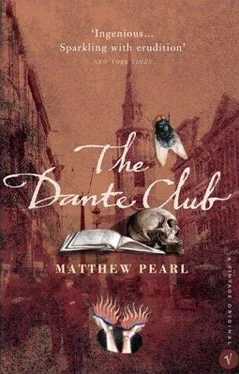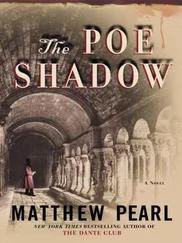“Tell me, Lowell, do you know whether the Atlantic has changed its payment policies? I mean, I haven’t heard whether you gave in any verses for the last number. Certainly, you’re busy enough with the Review .” Holmes’s fingers tangled with the check in his pocket.
Lowell wasn’t listening. “Holmes, you must have a good eyeful of this! Fields has outdone himself. There, go on. Have a look.” He nodded conspiratorially and watched carefully. The newspaper was folded back to the literary page and smelled of Lowell’s cigar.
“But what I mean to ask, my dear Lowell,” Holmes said insistently, putting the paper out of the way, “is whether recently—oh, many thanks.” He accepted a brandy and water.
Fields returned with a broad smile, stretching his rolling beard. He was as inexplicably cheery and complacent as Lowell. “Holmes! Wasn’t expecting the pleasure today. I was just about to send for you at the Medical College to see Mr. Clark. There was a blasted mistake in some of the checks for the last number of the Atlantic . You might receive one for seventy-five rather than a hundred for your poem.” Since the rapid inflation due to the war, top poets received a hundred dollars per poem with the exception of Longfellow, who got $150. Lesser names were paid between twenty-five and fifty.
“Truly?” Holmes asked with a gasp of relief that instantly felt embarrassing. “Well, I’m always happy for more.”
“This new batch of clerks, such creatures as you’ve never seen.” Fields shook his head. “I find myself at the helm of an enormous ship, my friends, that will drive upon the rocks if I do not watch it all times.”
Holmes sat back contentedly and finally glanced down at the New York Tribune in his hands. In stunned silence, he slipped deeply into the armchair, allowing its thick leather folds to swallow him.
James Russell Lowell had come to the Corner from Cambridge to fulfill long-neglected obligations at The North American Review . Lowell left the bulk of his work at the Review, one of Fields’s two top magazines, to a team of assistant editors, whose names he confused, until his presence was required for final proofing. Fields knew Lowell would appreciate the advance publicity more than anybody, more than Longfellow himself.
“Exquisite! You have a bit of the Jew in you yet, my dear Fields!” Lowell said, swiping the newspaper back from Holmes. His friends did not particularly notice Lowell’s strange gloss, for they were accustomed to his tendency toward theorizing that everyone of ability, including himself, was in some unknown way Jewish, or at least of Jewish descent.
“My booksellers will chomp at the bit,” Fields boasted. “We’ll build a shiny coach from the Boston profits alone!”
“My dear Fields,” Lowell said, laughing briskly. He patted the newspaper as if it held a secret prize. “If you had been Dante’s publisher, I daresay he would have been welcomed back to Florence with a street festival!”
Oliver Wendell Holmes laughed, but there was a little pleading too as he said, “If Fields had been Dante’s publisher, Lowell, he could have never been exiled.”
When Dr. Holmes excused himself to find Mr. Clark, the financial clerk, before they started for Longfellow’s house, Fields could see that Lowell was troubled. The poet was not one to hide displeasure, in any event.
“Don’t you think Holmes should seem more committed?” Lowell demanded. “He might have been reading an obituary,” he sniped, knowing Fields’s sensitivity about the reception of his puffs. “His own.”
But Fields laughed this off. “He is preoccupied with his novel, that’s all, and whether the critics will treat him fairly this time. Well, and he always has a hundred things on his mind. You know that, Lowell.”
“That is just the thing! If Harvard tries to daunt us further—” Lowell began, then started again. “I don’t want anyone to come to a notion that we’re not behind this to the end, Fields. Do you not ever wonder that this might be just another club for Wendell?”
Lowell and Holmes liked to sharpen their wits against each other, Fields doing what he could to discourage them. They competed mostly for attention. After a recent banquet, Mrs. Fields reported having heard Lowell demonstrating to Harriet Beecher Stowe why Tom Jones was the best novel ever written, while Holmes was proving to Stowe’s husband, the divinity professor, that religion was responsible for all the swearing in the world. The publisher was worried about more than the return of serious tension between two of his best poets; he was worried Lowell would stubbornly try to prove that his doubts about Holmes were correct. Fields could not afford that any more than he could afford Holmes’s trepidation.
Fields made a show of his pride in Holmes, standing beside a framed daguerreotype of the little doctor that hung on the wall. He put a hand on Lowell’s strong shoulder and spoke with sincerity. “Our Dante Club would be a lost spirit without him, my dear Lowell. Certainly he has his distractions, but that’s what keeps his brilliance. Why, he’s what Dr. Johnson would have proclaimed a clubbable man. But he’s been there for us all along, hasn’t he. And for Longfellow.”
Dr. Augustus Manning, treasurer of the Harvard Corporation, remained at University Hall later into the evenings than the other Harvard fellows. He often turned his head from his desk to the darkening window that glared back with indistinct light from his lamp, and he thought of the perils that daily rose up to shake the foundations of the College. Just that afternoon, he had been out for his ten-minute constitutional and recorded the names of several offenders. Three students were talking to one another near Grays Hall. By the time they saw him approach, it was too late; phantomlike, he made no noise, even when walking over crisp leaves. They would be admonished by the faculty board for “congregating”—that is, standing stationary in the Yard in groups of two or more.
That morning, at the College’s required six o’clock chapel, Manning also had called the attention of Tutor Bradlee to a student who was reading a book under his Bible. The offender, a sophomore, would be privately admonished for reading during chapel, as well as for the agitating tendency of the author—a French philosopher of immoral politics. At the next meeting of the College faculty, judgment would be entered under the young man’s name, there would be a fine of several dollars imposed, and points would be removed from his class standing.
Manning now thought about how to address the Dante problem. A staunch loyalist to classical studies and languages, Manning, it was said, had once spent an entire year conducting all his personal and business affairs in Latin; some doubted this, noting that his wife did not know the language, while other acquaintances remarked that this fact confirmed the story’s veracity. The living languages, as they were called by the Harvard fellows, were little more than cheap imitations, low distortions. Italian, like Spanish and German, particularly represented the loose political passions, bodily appetites, and absent morals of decadent Europe. Dr. Manning had no intention of allowing foreign poisons to be spread under the disguise of literature.
As he sat, Manning heard a surprising clicking sound from his anteroom. Any noise would be unexpected at this hour, as Manning’s secretary had gone home. Manning walked to the door and pushed on the handle. But it was stuck. He looked up and saw a metal point pushing into the doorframe, then another one several inches to the right. Manning yanked the door hard, again and again, harder and harder until his arm hurt and the door cracked open unwillingly. On the other side a student, armed with a wooden board and some screws, balanced on a stool, laughing as he tried to seal Manning’s door.
Читать дальше












